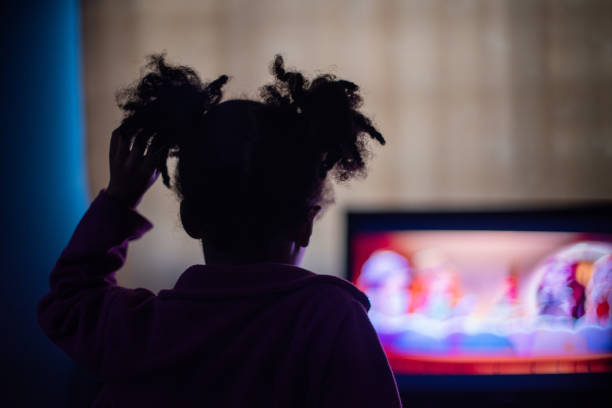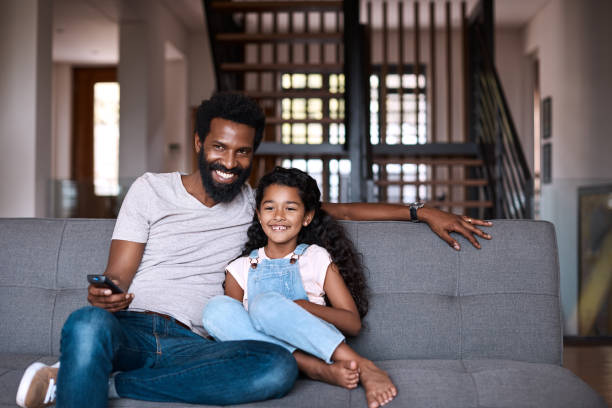Do you think your kid is watching too much TV?
I recently visited the pediatrician with my son. It was his first time in the States so there were lots of questions asked.
The one question that stuck with me was about his digital content consumption.
The nurse asked “how many hours would you say he spends watching TV?”
“About 6 to 8 hours” I said.
Six to Eight hours! Six to eight hours is the entire day for a toddler who sleeps 12hours through the night.
Drenched in guilt, I decided I was going to minimize how much TV he watches from then on.But first, I consulted google (as always).
How much is too much?

According to the American Academy of Pediatricians, children ages 2-4 years should have a maximum screen time of 1 hour per day. Anything above this means kids are watching too much TV.
Reading this worsened my plight. What a bad mother I have been. Armed with this piece of information, I set out to turn on the TV for just one hour a day.
Who was I kidding?
No…not because my toddler was throwing tantrums. Actually, he did not oppose as much as I expected him to. The joke was on me.
But the entire incident got me thinking. Is my son really watching TV for 8 hours? Is he watching too much TV at all?
Although we’ve pretty much settled into a routine, I decided to observe and possibly track our media consumption over the next couple of days.
Our Daily Routine
I’m a newbie to the States. My son is going on 3years. He has 3 more years before he can be enrolled in school and pre-school starts at 4years. We decided against Day Care mainly because of COVID and the cost ($250 per week is a lot of money).
So, I am currently a stay-at-home mom, with a 3-year-old, a 10-month-old and their father. Between catering to my needs and those of our family, I need the kids – the oldest specifically to be engaged so I can get things done.
The TV comes on at about 10:30am and stays on till around 9:00pm.
Between these 12 hours, we learn, play, eat and nap. Nap times can last anytime between 40mins to 2hours. Sometimes twice a day. At about 1pm every day, we often have a play/learn time where we use building blocks and colouring books. This can last anywhere between 15 to 45 mins.
Feedings are about 4 to 6 times daily including snacks. These can range from 10 to 30mins.
And then there is bath time, which ranges from 10 to 40mins at about 6:30pm each night. Around this same time, their father would have returned from work and taken over the TV. This is interspersed with family time, a reading session and a night snack until about 9pm when we all retire to bed.
Assuming we allocate 30mins to each of the stated activities, that’s a total of 3.5 hours off. Let’s add in 30 mins for each feeding time 4 times a day. That’s another 2 hours off. Leaving us with about 2.5 hours.
Research Vrs. Reality
Most studies on the effects of long hours of screen viewing cite 3 main concerns; physical activity, sedentary behavior and sleep problems.
Half the time that the TV is on, my toddler is on his feet, jumping, singing and dancing to some ditty about numbers, colours, and alphabets.
In terms of feeding, well you know how toddlers eat. I bet he burns all he eats whiles he is eating given the acrobatics that accompany each bite.
If that’s not physical activity enough…
For sedentary behaviour, my toddler follows me everywhere once I’m out of sight. So, if I have to pee 10 times, he is with me. Add that to how many times he has to pee and his sister needs a diaper change.
For all 4 or more times that I have to prepare his meal or snack, he follows me into the kitchen, using my utensils as toy drums. Definitely not sluggish or sedentary.
Finally, he gets between 10 to 12 hours of sleep through the night and naps at least once during the day, which is as expected for his age.
Of course, not all days are rosy. But on average, this is what a day looks like.
In essence, the 8 hours I bleated was no eight hours at all you see. And even if my son is watching a bit more TV than he should, he is getting enough sleep, physical activity and meeting his developmental milestones.
Not so bad after all
If we were in Ghana, he would have been in school by now, as is the case of most toddlers his age. Meaning, TV viewing would be limited to after school hours and weekends, which is not bad all.
So, if your toddler is in school, and you are worried they are watching too much TV…?
Breathe Mama. Take a step back. Observe it all. Take notes and monitor. It may turn out not to be as bad as you think, specifically when it comes to TV viewing.
“Beginning at about 2 years, quality TV—well-designed, age-appropriate programs with specific educational goals—can provide an additional route to early language and literacy for children”
National Library of Medicine
The fact is, many studies lump all screen time together. But there actually is a growing amount of evidence that co-viewing quality content with your kids can positively influence children’s social adaptive skills, sleep patterns and behaviours.
This is likely the case in most households as preschoolers are usually with a parent or designated caregiver.
So, TV is not so bad after all.
But if you still fear that your child is watching too much TV, look out for these signs.
Minimize , Monitor & Engage (MME)

That said, I have done my best to minimize his screen time. The key is to minimize, monitor and engage (MME).
I have resorted to turning on the TV only after 12pm each day as often and as practical as possible. Try this if you can. There are good days and not so good days. In the end, kids are kids and they will find other ways to play when the TV is not on.
I also turn it off during learn/play times, nap times and sometimes meal times, thereby reducing the distractions from having it on in the background.
In terms of content, I mostly choose interactive and activity-based content. These are free and accessible through kids’ apps. My favorite is YouTube Kids (not listed), where you can find content on a variety of subjects and the ads are for kids so you don’t have to worry about their exposure to any adult content.
By using kids’ apps, you are able to monitor what they watch and subsequently engage them in conversations about it.
Note that, though these tactics seem suited to stay at home moms with preschoolers, you can adapt them for use during the weekends or on vacations if your child in enrolled in day care or pre-school.
Check out for similar resources relating to your child’s age and current status (for instance if they are homeschooled) and fine tune them to your taste. You can even try this family media plan.
Whatever happens, don’t be hard on yourself. You love your kids and you are doing your best for them. There maybe excesses here and there but that’s ok Mama. They will turn out just fine.
So … do you think your kid is watching too much TV?










Dear writer,
Nice write up. It captures about 90% of my views on the subject matter.
Looking forward to your next piece!